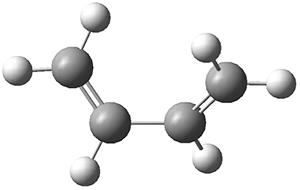Sometimes you run across a paper that is surprising for a strange reason: hasn’t this work been done years before? That was my response to seeing this paper on the structure of gauche-1,3-butadiene.1 Surely, a molecule as simple as this has been examined to death. But, in fact there has been some controversy over whether the cis or gauche form is the second lowest energy conformation. Computations have indicated that the cis form is a transition state for interconverting the two gauche isomers, but experimental confirmation was probably so late in coming due to the small amount of the gauche form present and its small dipole moment.
This paper describes Fourier-transform microwave (FTMW) spectroscopy using two variants: cavity-enhanced FTMW combined with a supersonic expansion and chirped-pulse FTMW in a cryogenic buffer gas cell. In addition, computations were done at CCSD(T) using cc-pCVTZ through cc-pCV5Z basis sets and corrections for perturbative quadruples. The computed structure is shown in Figure 1. In addition to confirming this non-planar structure, with a C-C-C-C dihedral angle of 33.8°, they demonstrate the tunneling between the two mirror image gauche conformations, through the cis transition state.

Figure 1. Computed geometry of gauche-1,3-butadiene.
References
1. Baraban, J. H.; Martin-Drumel, M.-A.; Changala, P. B.; Eibenberger, S.; Nava, M.; Patterson, D.; Stanton, J. F.; Ellison, G. B.; McCarthy, M. C., "The Molecular Structure of gauche-1,3-Butadiene: Experimental Establishment of Non-planarity." Angew. Chem. Int. Ed. 2018, 57, 1821-1825, DOI: 10.1002/anie.201709966.
InChIs
1,3-butadiene: InChI=1S/C4H6/c1-3-4-2/h3-4H,1-2H2
InChIKey=KAKZBPTYRLMSJV-UHFFFAOYSA-N

Steven Wheeler responded on 31 May 2018 at 4:54 pm #
Jaan Laane experimentally established the non-planarity of cis 1,3-butadiene via Raman spectroscopy back in 2012:
https://pubs.acs.org/doi/abs/10.1021/jp208739d